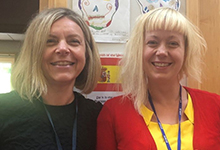Language learning for primary classrooms, as TELT by teachers
Authors:
Wendy Craig and Aimee Bainbridge work at Newtonhill Primary School in Aberdeenshire.
Both are class teachers. Wendy is Deputy Head Teacher (DHT) and Aimee, a Principal Teacher and Acting Deputy Head, is also a PE Teacher.
Wendy Craig and Aimee Bainbridge share their experiences of taking part in the Open University’s TELT programme – TEachers Learning to Teach languages.
TELT aims to increase and improve language provision in primary schools. Teachers learn a new language, and at the same time, the skills to teach that language in the classroom.
TELT is inspired by and contributes to delivery of the Scottish Government’s 1+2 language policy. It was developed in collaboration between the OU and SCILT, Scotland’s National Centre for Languages.
Having completed the first part of the TELT pilot Level 1 course, Wendy and Aimee are both progressing to part 2 this year.
Why did you choose to take part in TELT?
Wendy: As DHT of a large primary school and also a lover of languages, travel and foreign cultures, I volunteered to introduce and develop the Scottish Government’s 1+2 language policy across our school. When our Local Authority told us about the opportunity to take part in the TELT pilot, we jumped at it.
It was a fantastic way to start building confidence in the delivery of language teaching, and to start developing a pocket of expertise and enthusiasm within our staff, which could be accessed by other teachers.
I was excited to develop my beginner’s Spanish and the course structure was easy to dip in and out of at times which suited me. I liked the idea of having other teachers across the country to work with and share good practice.
Aimee: I came to Newtonhill directly from China. The school had already been allocated Spanish as its first foreign language (L2) but everyone was still a wee bit timid about it. I had learned German at school and loved learning and speaking Cantonese in China, but had never attempted Spanish.
My first Newtonhill class was a P2. I taught some Spanish that year, however was so terrified of getting pronunciation or grammar wrong that I stuck to very basic, and what must have been quite boring, vocabulary lessons.
I wanted a basic grasp of the rules and patterns of Spanish, to know some key phrases, how to read and pronounce it but, most importantly, I wanted to learn what immersive teaching should feel like for our pupils.
What’s been your highlight of TELT?
Wendy: The most important bit for me has been the confidence and enthusiasm I have gained in learning and teaching a new language.
The pupils were on board from the start, and really embraced the idea that I was learning at the same time as them.
Being able to use ideas from the pedagogy section of the course to teach the Spanish I was learning was fabulous and meant it wasn’t giving me extra work – half my lesson planning was done through the course.
The effect it had on the children was also a huge highlight, and there was a huge buzz about language learning right through the school.
Aimee: The main highlight for me has been the reassurance from tutors and fellow course learners that we are all learning and it’s OK to be honest with the pupils – making it a lot easier and more fun.
My pupils reflected with me about which approaches worked best and why. We have talked about how a particular lesson went, what language has stuck and why, we look things up together, they remind me and teach me and it’s great!
You also share your experiences and reflections with course colleagues and learn from theirs. I got heaps of great lessons, ideas and feedback from my course tutors and colleagues which I continue to use and learn from.
How have your pupils reacted to language learning?
Wendy: All of our students were asked to do Spanish after being a French-learning school for years, and the new teaching strategies and ideas really helped to make Spanish instantly popular.
 They have loved all the games, songs, tongue twisters and activities (especially cooking and anything food related!) that we were given on the TELT course, and many children have used and developed these at home.
They have loved all the games, songs, tongue twisters and activities (especially cooking and anything food related!) that we were given on the TELT course, and many children have used and developed these at home.
Their achievements in Spanish, and now in French as our second foreign language (Language 3), have been notable, and attainment is above average.
Parents in all year groups have commented on how impressed they are, they love the learning and teaching strategies being used in school, and have really got behind activities and events we have run for the wider school community.
Aimee: Our pupils are incredibly enthusiastic about learning Spanish and increasingly confident and capable. The wide variety of teaching ideas, activities and strategies gained from TELT have really enlivened and emboldened our language learning.
Our pupils make their own videos and poems in Spanish. We did our nativity entirely in Spanish, assemblies have been done in or about Spanish language and culture, we’ve held Community Cafes where pupils have taught Spanish to use on holiday, and we even have a School Working Party where P1s to P7s plan how to promote and improve our language learning even more.
Our children are all in for Spanish now - it’s like the school’s mascot or badge. Newtonhill are awesome at Spanish! We all know it and are very proud of it!
What’s next for language learning in your school?
Wendy: A third colleague from Newtonhill who did the TELT pilot has moved to another cluster in our Local Authority to become a peripatetic Spanish teacher across a few primary schools. If I hadn’t gained a funded place on Year 2 of TELT, I had intended to start an OU Spanish and French degree, but will now complete Year 2 first. I am keen to start the next level of TELT to access more great resources!
Across school we are focusing more this year on CLIL (Context and Language Integrated Learning) approaches now our grammar, vocabulary and pronunciation are a bit better. I’m looking forward to trying Spanish and technology lessons on my P7s!
We previously ran two successful Erasmus projects in conjunction with TELT, enabling me and several other staff to attend Spanish immersion courses, and we hope to find alternative ways to fund these in future.
We also hope to establish a Spanish Coffee Club, where our trained teachers can advise and support other teachers’ flexibility and confidence in language learning and teaching.
Aimee: This year I will be teaching PE two days a week. My plan is to do as much of it as possible in Spanish! I was invited to be a tutor on the Level 1 pedagogy strand of this year’s TELT, which I am very excited about!
At school, Spanish will continue to be part of assemblies, nativities, Glee Club, daily routines and greetings. We would like to continue to involve our wider community through Cafes, International Day events and more.
It is a genuinely exciting process, working with our pupils and then putting ideas into plans and action! We narrowly missed out on an Education Scotland award last year for 1+2 and Internationalism. This year we would like to win it!
Find out more about TELT, including how to register.
2025 update: the 2025-26 session is the concluding presentation of the TELT programme, and will offer post-beginners level study.
News

Universities share joint focus on dementia in Dumfries
The OU in Scotland and UWS have shared their joint commitment to improving the lives of those with dementia in the Dumfries area.

Rural Business Bootcamp launched for Female Entrepreneurs
The OU in Scotland and SRUC have announced a new initiative to empower women in entrepreneurship with the launch of a Rural Business Bootcamp.
Media contacts
Media enquiries
OU in Scotland Media Relations:
Call 0131 549 7932
OU UK Press Office:
Call 01908 654316
Out-of-hours:
07901 515 891
Visit our OU UK news site
Newsletter
Sign up for our quarterly e-newsletter, Open Outlook.
